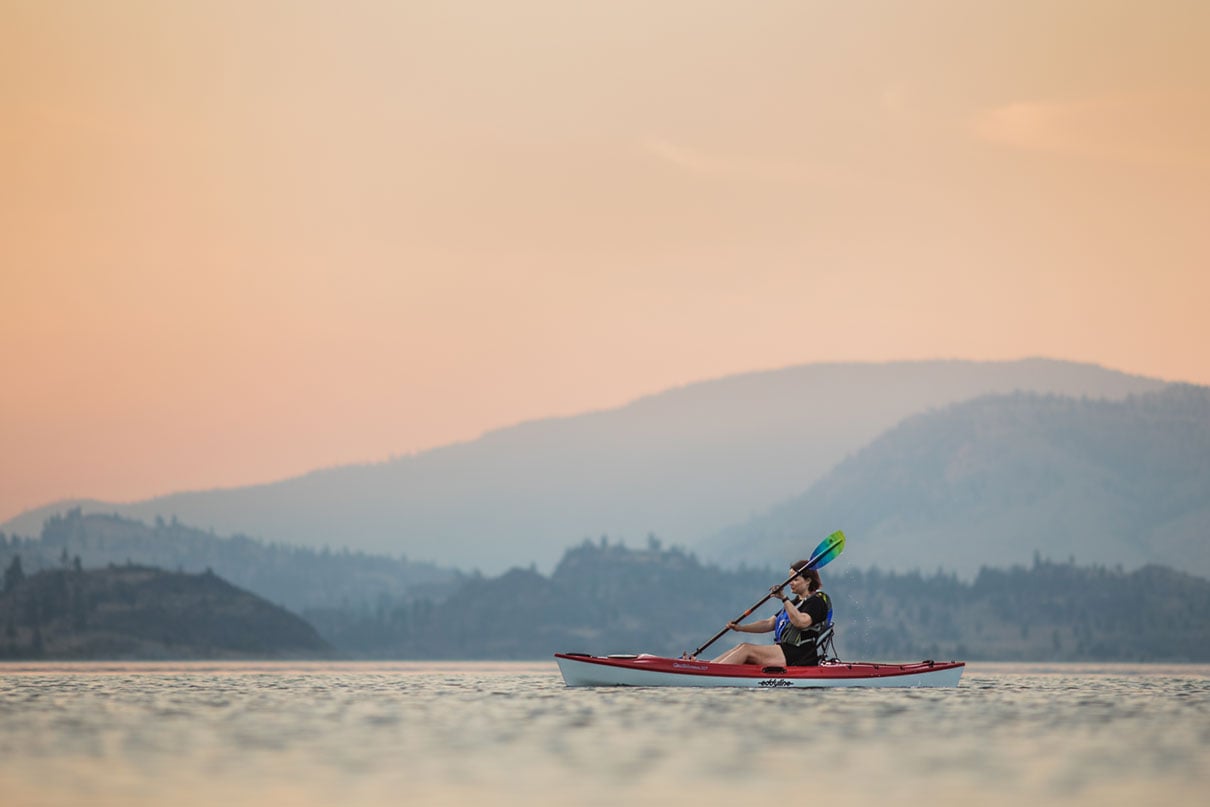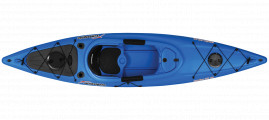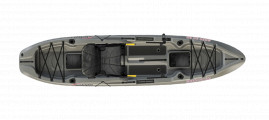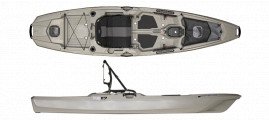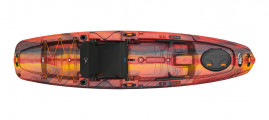The 12-foot kayak is a great overall length for recreational paddlers. This size of kayak is long enough for good glide yet also compact for nimble handling on and off the water. The best 12-ft kayaks come with a variety of options to meet your paddling needs, from casual paddling to kayak fishing to day touring and more.
This article provides a comprehensive overview of the 12-ft kayak market, including boats from all manufacturers across the entire price spectrum. A 12 foot kayak is an excellent option for recreational paddlers looking for a sit-in or sit-on-top kayak that performs well for casual use on calm, sheltered water.
Top picks: Best 12-foot kayaks for 2025
The following 12-foot kayaks have received the highest star ratings by reviewers in our Paddling Buyer’s Guide. See and review all 12-foot kayaks here.
Best 12-Foot Kayaks
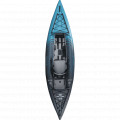
Chelan 120
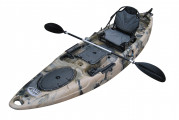
BKC RA220 Sit On Top Angler Kayak
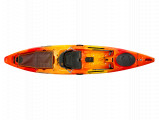
Tarpon 120 Fishing Kayak

Pungo 120 Recreational Kayak
Shop 12-foot kayaks
Are you shopping for a 12-ft kayak? The links in this section will take you to our comprehensive Paddling Buyer’s Guide, where you’ll find all the best 12-ft kayaks on the market, including reviews, ratings and where to buy. You can choose to filter kayaks by type and application, such as fishing or touring, one-person or tandem, and those with accessories like rudders or pedal-drive systems, and so much more.
Detailed reviews of specific models include specs, prices and where to buy; we’ve also narrowed down the best kayaks at the most popular retailers including sporting goods stores, outdoors stores and big box department and hardware stores. You simply will not find a more comprehensive kayak buyer’s guide resource on the web.
Shop by type
Shop by brand
Current Designs 12-foot kayaks
12-foot Dagger kayaks
Eddyline 12-foot kayaks
Emotion kayaks 12
Hobie 12 kayaks
Jackson kayaks 12
Lifetime 12-foot kayaks
Liquidlogic 12-foot kayaks
Native kayaks 12 ft
Old Town 12-foot kayaks
Pelican 12 ft kayaks
Perception 12-foot kayaks
Riot kayaks 12
Sun Dolphin 12 ft kayaks
Vibe 12 kayaks
12 ft Wilderness kayaks
Shop by price
Shopping for a used 12-foot kayak?
Think you’ve scored a great deal on a used 12-foot kayak on Craigslist? The 12-foot kayak is one of the most popular lengths, so you’re sure to find plenty of them listed on buy-and-sell websites like Craigslist, Kijiji and Facebook Marketplace. Wondering how to make a good investment in a used kayak? Your first step is to research the specific attributes of the used kayak you are considering.
Our Paddling Buyer’s Guide provides an exhaustive database of every kayak on the market, making this the ideal place to start. If you decide your Craigslist 12-foot kayak is a solid candidate to meet your needs, consider the following advice to make a good used kayak purchase.
- Buy the right used kayak for your paddling preferences by researching the particular model in advance to determine whether or not it truly meets your needs. Consider the type of water you’ll be paddling; remember, you’ll want a more maneuverable 12-foot kayak for twisty rivers as opposed to something that’s straighter tracking for paddling on lakes and ponds. Be aware that most 12 ft kayaks are only safe to use on calm, sheltered water.
- Take the time for a detailed visual inspection. Give the used kayak a once-over, looking for obvious damage to the hull (bottom), deck (top) and outfitting (seat, back rest, foot pegs, etc). Scratches aren’t a problem, but watch out for deep gouges that extend more than ⅛th of an inch (3 mm) into the plastic. Obvious warping in the hull is a problem to avoid, too.
- Try to determine how the kayak was stored. A kayak that was stored outdoors for long periods of time may be subject to fading due to UV radiation (which also weakens the kayak’s structure) and damage due to excessive snow loading or precipitation.
- Taking the kayak for a test paddle is the best way to find if the 12-foot kayak works for you, in terms of performance, handling, comfort and fit.
- Remember, the 12 ft kayak class is extremely popular, so perhaps the best advice is to be patient and know that there’s no harm in waiting to discover a perfect match.
For more tips on what to look for when selecting a used kayak, read our article How To Buy A Used Kayak.
12-foot kayak buying guide
A bewildering array of 12-foot kayaks are available across North America at big box stores, outdoors stores, paddlesports specialty retailers and online outlets. You can buy 12-foot kayaks to meet a wide range of paddling needs, including recreational paddling and fishing, single and tandem, for paddlers of all sizes.
This length of kayak offers supreme versatility, with a good balance of glide and maneuverability in a size that’s easy to transport and store. With such selection comes a huge range of prices, quality of construction and performance characteristics.
Start by determining what type of 12-foot kayak best aligns with your paddling goals. Kayaks are divided into categories based on type of use. These include recreational kayaks designed for casual use on sheltered water; day touring kayaks, which feature additional volume and better glide for longer journeys; and fishing kayaks for angling in a variety of conditions.
Many of these types of kayaks are available as single (one-person) and tandem (two-person) models, with open (sit-on-top kayaks) or closed (sit-in kayaks) decks. Here’s a rundown of some of the more popular types of 12 ft kayaks:
Sit-inside kayaks offer the best protection from the weather and water, especially important in colder climates and on exposed coastlines. They also tend to be lighter and offer more interior dry storage than other kayak types. Sit-inside is the dominant style of recreational 12-foot kayak.
Sit-on-top kayaks are self-draining and easy to scramble back aboard after a capsize or upset. The open deck makes it simple to hop on or off, and these designs are also usually more stable than their sit-inside counterparts. Sit-on-top is the dominant style of fishing kayak.
Inflatable and folding kayaks are lightweight and easy to store and transport, with some 12-foot kayak models available.
Hard-shell or rigid kayaks offer superior performance to inflatable kayaks, but they require more space to store and a means of transporting to and from the water on top of your vehicle. Constructed of plastic or composite (fiberglass) materials, they tend to be faster in the water and more readily cut through windy and wavy conditions as they sit lower in the water. This tends to be the most common construction for 12-foot kayaks.
Recreational kayaks are ideal for paddlers who spend most of their time on lakes and slow-moving rivers. A 12-foot kayak is very common for this type of boat. They typically have a flatter hull and are wider than most touring kayaks, giving them greater stability. However, the extra width also means they will drag more in the water and wind, making them a little slower than some other types of kayaks.
Touring and sea kayaks are typically 14 to 18 feet in length, making them longer than most other types of kayaks; however, a few shorter, 12-foot kayaks are available in this category. These boats are designed to track straight though the water; however, they can be more difficult to turn. Touring kayaks provide storage space for overnight or multi-day trips. This type of kayak tends to be narrower and sit lower in the water, features allowing for greater speed and efficiency as the kayak cuts easily through wind and water.
Fishing kayaks are built for stability and durability, and usually not speed; 12-foot fishing kayaks are very common. They generally have lots of storage space for fishing tackle and gear, in addition to specialized features such as rod holders, mounting brackets, bottle holders and anchor lines, among others. Some have pedal-drive systems or trolling motor mounts so anglers can reach the fishing grounds faster.
Use this as a starting point to determine the 12-foot kayak that best matches your needs. But remember, online research will only get you so far. The best advice we can offer is to always test paddle before buying any boat. Most paddlesports specialty stores offer the opportunity to take new boats for a quick spin; but that’s not possible at big box stores.
You can also try to borrow friends’ kayaks for test paddling in real-world conditions. The more time you can spend on the water in a similar style of kayak, the better the purchasing decision you will make.
Here are answers to some of the most common online questions about 12-foot kayaks.
-
10 ft vs 12 ft kayak
The main difference between a 10 ft vs 12 ft kayak is glide and maneuverability. In general, a 12-foot kayak offers more glide, while a 10-foot kayak will be easier to handle. Additional storage capacity (or sitting space, in the case of a sit-on-top kayak) is another advantage of a longer 12 ft kayak.
Performance increases with length in most recreational kayak designs, so choose a longer boat if you’re looking for a better ride—just remember that a longer boat may be more difficult to handle if you’re a smaller person.
-
12 or 14 foot kayak
Twelve- to 14-foot kayaks bridge the gap between recreational and touring kayaks. A 14-foot kayak offers the performance and glide of a touring (sea) kayak, while a 12-footer provides the comfort, stability and easy handling of a recreational kayak.
Lean towards a 14-foot kayak if you wish to develop your skills and progress to more challenging paddling conditions, or if you need additional space for camping gear for overnight trips.
-
How to transport a 12-foot kayak
It’s important to transport your 12-foot kayak safely, and that means using ropes and straps and a properly designed kayak rack system for your vehicle. Kayak foam blocks work for short road trips, but if you plan to cartop your kayak regularly you should invest in a dedicated roof rack system. Not only do roof racks provide secure transport at highway speeds, they also protect your car’s finish from dings and dents.
Be sure to secure your 12-foot kayak at four points, with two straps (or ropes) over the mid-section of the kayak (at the roof racks) and with bow and stern ropes on either end. You may want to consider a folding 12-foot kayak (such as the Oru Bay ST) or an inflatable 12-foot kayak if you do not own a car or would prefer not to invest in a roof rack.
-
12-foot kayak weight
The weight of a 12-foot kayak varies considerably with design and material. Fishing kayaks and other sit-on-top kayaks are generally heavier than sleeker sit-inside kayaks. Composite materials like fiberglass produce lightweight 12-foot kayaks in the 30-pound range (or lighter in the case of Kevlar and carbon fiber construction).
Meanwhile, rotomolded plastic 12-foot kayaks weigh between 40 and 70 pounds. Some ultralight 12-foot kayaks tip the scales at under 30 pounds. In general, expect to pay more for a lighter kayak.
-
12-foot kayak weight limit
A typical 12-foot kayak has a weight limit of 250 to 300 pounds, but that will vary with design. Wider kayaks have a higher weight capacity compared to sleeker, narrower boats. Sit-on-top kayaks also have greater weight capacity.
-
Fastest 12-foot kayak
Because a kayak’s speed is a function of its length, most 12-foot kayaks cannot be described as particularly fast. However, sleek, narrow designs with minimal rocker (upturn at the ends) will offer the best speed and glide.
One particular 12-foot kayak model that meets this description is the Epic GPX, which is especially fast and responsive—ideal for those looking for a high-performance kayak with compact dimensions.
-
Is a 12-foot kayak too big?
The question, “Is a 12-foot kayak too big?” depends on how and where you intend to use the kayak and your body type. A 12-foot kayak bridges the gap between recreational and touring (sea) kayaks, offering beginner-friendly stability with some of the glide and performance of a longer boat. However, it may be too big for river paddling, especially if you’re looking to navigate twisting and turning waterways.
The best way to gauge whether or not a 12-foot kayak matches your body size is to sit in it and see how it feels for you. The upper weight limit of a particular model is another good metric to determine if this is the right size kayak for you.
-
How much is a 12-foot kayak?
Prices for 12-foot kayaks vary considerably, ranging from entry level models sold for $400 or less at big-box department stores to high-performance, ultralight 12-footers with price tags of $2,500 or more. When it comes to kayaks, you often get what you pay for in terms of comfort, accessories, performance and safety on the water.
However, it’s okay to buy a cheaper 12 ft kayak if your main objective is casual paddling in calm, sheltered conditions. Being honest with your objectives and expectations is the first step to making a wise investment.
12-foot kayak reviews
An important step in your search for the perfect 12-foot kayak is to read reviews of the models you’re interested in. Each review will provide insight into the comfort, performance and features the kayak offers, and will help you identify whether this is a boat that matches your paddling aspirations. Find our expert reviews below.
- Fishing Kayak Review: SeaStream Angler 120 PD
- Fishing Kayak Review: Ascend 12t
- Fishing Kayak Review: Sun Dolphin Boss 12 SS
- Fishing Kayak Review: Ascend 128t
- Fishing Kayak Review: Perception Pescador 12
- Hybrid Fishing SUP Review: Vibe Cubera 120



